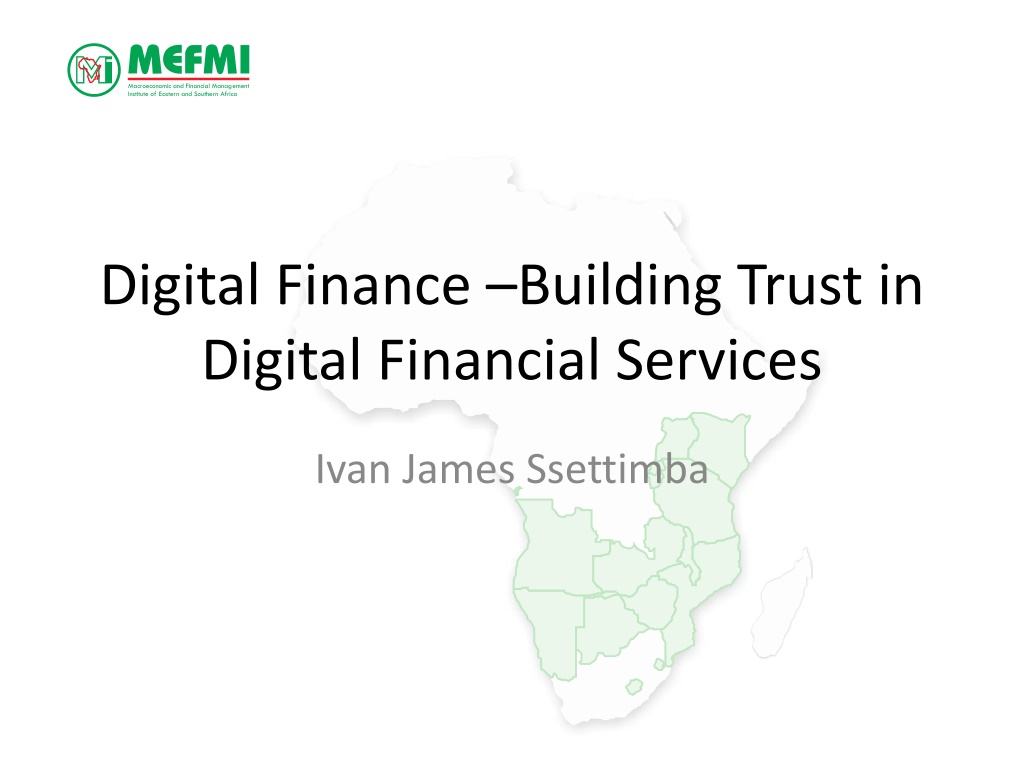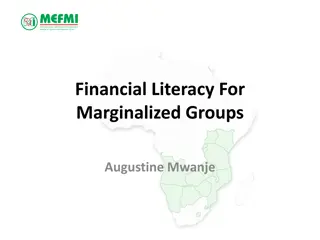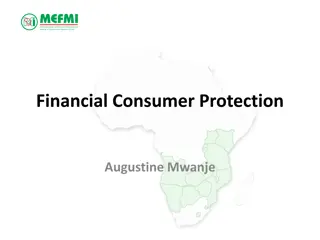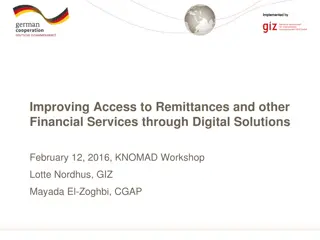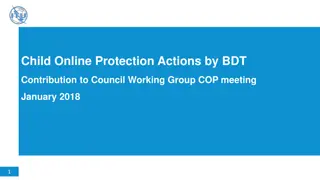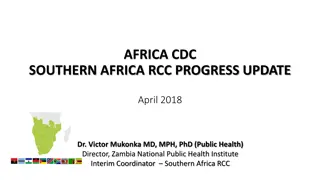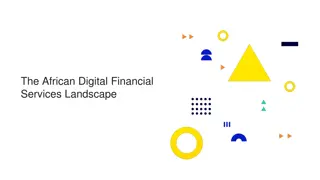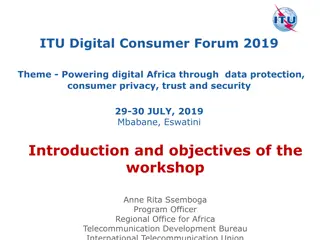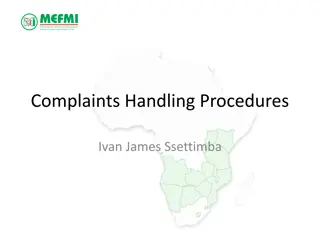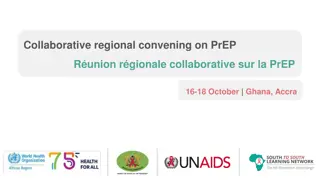Enhancing Digital Financial Services in Eastern and Southern Africa
Explore the significance of Digital Financial Services (DFS) in the Eastern and Southern Africa region, focusing on topics such as mobile money, service quality, fair customer treatment, and agent integrity. Understand the impact of DFS on financial inclusion and the reasons behind the increased interest in promoting these services. Delve into the need for DFS and the broad range of financial services offered through digital channels like mobile phones and the internet.
Download Presentation

Please find below an Image/Link to download the presentation.
The content on the website is provided AS IS for your information and personal use only. It may not be sold, licensed, or shared on other websites without obtaining consent from the author. Download presentation by click this link. If you encounter any issues during the download, it is possible that the publisher has removed the file from their server.
E N D
Presentation Transcript
Macroeconomic and Financial Management Institute of Eastern and Southern Africa Digital Finance Building Trust in Digital Financial Services Ivan James Ssettimba
Outline Macroeconomic and Financial Management Institute of Eastern and Southern Africa Introduction Mobile Money as DFS Service Quality of DFS Fair treatment of Customers Quality and integrity of Agents
Institute of Eastern and Southern AfricaDigital Financial Services Macroeconomic and Financial Management What are Digital Financial Services? Why promote Digital Financial Services? Five minutes to think about these two questions and then discuss in plenary
Introduction Macroeconomic and Financial Management Institute of Eastern and Southern Africa The broad range of financial services accessed and delivered through digital channels, including payments, credit, savings, remittances and insurance. digital channels refer to the internet, mobile phones (both smart phones and digital feature phones), ATMs, POS terminals, NFC- enabled devices, chips, electronically enabled cards, biometric devices, tablets, and any other digital system. DFS models usually employ agent networks to deliver financial services Source: AFI Digital Financial Services Working Group
Introduction Macroeconomic and Financial Management Institute of Eastern and Southern Africa
Introduction Macroeconomic and Financial Management Institute of Eastern and Southern Africa Why increased interest in DFS in past few years? Facilitates financial inclusion through: Allowing for innovative delivery channels to increase access Minimizing cost of offering financial services Providing services at a cost people can afford Allowing for innovation around information based financial services Providing increased convenience and affordability of services to customers.
Introduction Macroeconomic and Financial Management Institute of Eastern and Southern Africa Who needs digital financial services?
Introduction Macroeconomic and Financial Management Institute of Eastern and Southern Africa Benefits of digital financial services? Benefits to FSPs Function Benefits to Customers
Mobile Money as DFS Macroeconomic and Financial Management Institute of Eastern and Southern Africa Mobile Money is one of the most profound DFS A type of electronic money (E-Money) that is transferred electronically using mobile networks and SIM-enabled devices, primarily mobile phones. The issuer of mobile money may, depending on local laws and the business model, be an MNO, a financial institution or another licensed third-party provider. As shown in the preceding slides, uptake of MM has been enormous thus a need for customers to have a good understanding of MM-
Mobile Money as DFS Macroeconomic and Financial Management Institute of Eastern and Southern Africa Source: GSMA State of Industry Report 2017
Mobile Money as DFS Macroeconomic and Financial Management Institute of Eastern and Southern Africa Source: GSMA State of Industry Report 2017
Mobile Money as DFS Macroeconomic and Financial Management Institute of Eastern and Southern Africa Source: GSMA State of Industry Report 2017
Mobile Money as DFS Macroeconomic and Financial Management Institute of Eastern and Southern Africa Source: GSMA State of Industry Report 2017
Mobile Money as DFS Macroeconomic and Financial Management Institute of Eastern and Southern Africa Source: GSMA State of Industry Report 2017
Mobile Money as DFS Macroeconomic and Financial Management Institute of Eastern and Southern Africa Source: GSMA State of Industry Report 2017
Service Quality of DFS Macroeconomic and Financial Management Institute of Eastern and Southern Africa As uptake of DFS increases there is need to ensure protection of consumers; By empowering them to make informed financial decisions By enabling them exercise their rights and meet their obligations By ensuring they have access to adequate, timely and efficient redress for their complaints. Consumer protection regulations tend to pursue the following broad objectives: to ensure that consumers have enough information to make informed financial decisions; ii) to prevent unfair practices by service providers; and iii) to ensure that consumers have access to recourse mechanisms to resolve disputes.
Service Quality of DFS Macroeconomic and Financial Management Institute of Eastern and Southern Africa Objectives should be balanced i.e. not place onerous restrictions on the provision of the financial products and services and the channels used to deliver them. Particularly important when the target population is low income and/or disadvantaged group, Vulnerable segments of the population, are usually first timers with formal financial services and have limited ability or power to protect themselves from unfair practices. Regulators face a dilemma: protecting consumers without imposing high compliance costs on service providers. High costs can affect the ability of DFSP to make services accessible to this target population and negatively impact their business model. To achieve the required balance there is need to clearly identify the risks and constraints consumers face when they register for DFS
Service Quality of DFS Macroeconomic and Financial Management Institute of Eastern and Southern Africa Identify challenges that may arise when they use MFS, such as those related to language, culture and general knowledge and attitudes about technology Next, regulators should be aware of and understand all the factors that influence the conduct of DFSPs and to manage the risks and inherent costs involved Key issue is whether the provision of financial services through mobile phones changes the risks consumers face with traditional channels. DFS dramatically reduce the cost of delivering financial services and promote greater financial inclusion, by reaching new segments of the population and more geographical areas. With lower delivery costs, providers are able to provide services to more customers, creating transaction volumes- thus increased profitability
Service Quality of DFS Macroeconomic and Financial Management Institute of Eastern and Southern Africa With a broad target market that includes the unbanked, who may be using financial services for the first time, Risks come from both the demand and supply side. Large proportion of target customers may not be literate in regard to DFS and may be technologically challenged Use of DFS introduces new operational and technical risks, such as new forms of fraud and inappropriate product design and system failures The above two can lead to loss of trust and confidence by the consumers. There is need for regulators to protect consumers of DFS, through identification of vulnerabilities at the various stages of consumption of DFS
Service Quality of DFS Macroeconomic and Financial Management Institute of Eastern and Southern Africa Marketing stage: Consumer is informed about service availability Vulnerability: Lack of consumer knowledge or understanding of the new service and DFSP. Lack of awareness or misperception about the nature/gravity of different risks of using the service (including the comparison to current informal options). Threats: Gap between a customer s expectations and the services actually offered Uncertainty about which party is ultimately responsible Risks: Potential for fraud Errors in making decisions Lack of trust, failure to adopt service CP Initiatives : Create a requirement that DFSPs provide clear, adequate, accurate and complete information to consumers about the responsibility of the DFSP and keyfacts related to registration, transactions and product/service features
Service Quality of DFS Macroeconomic and Financial Management Institute of Eastern and Southern Africa Registration stage: Client receives information about the service, fills out a registration form and selects a PIN Vulnerability Threats Risks CP Initiatives : Insufficient agent training Lack of client knowledge and awareness of risk Inadequate data security platforms and processes Poor services Lack of adequate information from agent Weak security of selected PIN or storage of personal information in the mobile phone Inadequate handling of customer data at agent s premises (including both privacy and data security concerns) Reputational risk Operational risk: identity theft or theft of authentication parameters, which can lead to a loss of funds Disclosure of information and operator support Accessible, complete, clear, plain and understandable language Client education and awareness programs Consumer complaints and redress mechanism
Service Quality of DFS Macroeconomic and Financial Management Institute of Eastern and Southern Africa Transaction stage: Customer performs cash-in/out transactions, payments and transfers Vulnerability Threats Risks CP Initiatives Low-income/ indigenous population with limited access to information or low levels of literacy/numeracy (e.g. Terms and Conditions) Shared mobile phone usage within the family or community Transactions facilitated by agents or others Customer interface is overly complex and not intuitive Inaccurate/uninfor med decisions Potential for fraud Erroneous transactions Vulnerability fraud Loss of trust Disclosure of information Accessible information Consumer education Improvements in business processes that reduce the risks (e.g. contact/address book appears to facilitate transaction or the receiver s name appears before the person confirms the transaction, to reduce transactions sent to an unintended third party) to
Service Quality of DFS Macroeconomic and Financial Management Institute of Eastern and Southern Africa Transaction stage: Customer performs cash-in/out transactions, payments and transfers Vulnerability Threats Risks CP Initiatives Provision of DFS relies on i. Client equipment with low security functionality and lack of end-to-end encryption ii. Client skill in following procedures and security measures Interception of traffic between mobile phone and point of service Inaccurate transactions wrongful access, used to transactions transactions Loss of client funds Identity theft, Minimum security requirements for mobile phones Product design and business process improvements Appropriate risk management policies Customer service support Consumer complaints and redress mechanisms Educational campaigns conduct Erroneous
Service Quality of DFS Macroeconomic and Financial Management Institute of Eastern and Southern Africa Transaction stage: Customer performs cash-in/out transactions, payments and transfers Vulnerability Threats Risks CP Initiatives Provision of DFS relies on iii. Communication network Failures in the system, inability to complete transactions Reputational risk Incomplete delayed transactions Possible funds Customer support services Minimum standards for uptime Require alpha/beta system tests Redundancy and contingency plans Ensuring real-time transaction services are in place and must be used or loss of
Service Quality of DFS Macroeconomic and Financial Management Institute of Eastern and Southern Africa Transaction stage: Customer performs cash-in/out transactions, payments and transfers Vulnerability Threats Risks CP Initiatives Provision of DFS relies on iv. Agent network Fake agents Agent misconduct and poor service Lack of agent liquidity Potential for fraud Perception that the service is unreliable DFSP liable for agent services and conduct Agent training and oversight Minimum requirements, proper signage, training and support for agent networks Liquidity management/support Disclosure of transaction limits 24/7 operator support Consumer complaints and redress mechanism
Service Quality of DFS Macroeconomic and Financial Management Institute of Eastern and Southern Africa Acquisition, transaction or more complex value-added stages Vulnerability Threats Risks CP Initiatives Diverse DFSPs New financial service providers as DFSPs Misuse of funds DFSP insolvency Inadequate management of fraud risks Fraud Loss stored value funds DFSP bankruptcy All DFSPs under supervision Protection of funds and investment policies (i.e. trust agreements) Both internal and external consumer complaint and redress mechanisms of client s
Service Quality of DFS Macroeconomic and Financial Management Institute of Eastern and Southern Africa Acquisition, transaction or more complex value-added stages Vulnerability Threats Risks CP Initiatives Personal and transaction information known to DFSP or agents Client privacy Issues Reputational risk Fraud identity theft Data privacy and client secrecy regulations Internal and external consumer complaint and redress mechanisms and/or
Service Quality of DFS Macroeconomic and Financial Management Institute of Eastern and Southern Africa Acquisition, transaction or more complex value-added stages Vulnerability Threats Risks CP Initiatives Outsourcing part or all DFS to third parties Customers unclear about which party is responsible and where, how and whom to address complaints Complaint is not handled adequately risk Reputational Clear customer communication re: who the DFSP is and who is responsible for each of the services provided 24/7 customer support Internal and external consumer complaint and redress mechanisms (and standards to ensure they are adequate and consistent) and reporting requirements to allow the supervisor to monitor potential trouble spots or poorly performing DFSPs in the market
Fair treatment of Customers Macroeconomic and Financial Management Institute of Eastern and Southern Africa Responsibilities of Regulators Put in place a proportionate risk-based regulatory framework for consumer which also allows for innovation and aims to achieve the overall objective of financial inclusion; Approve DFSPs to operate under clear rules to protect consumer funds from misappropriation by the DFSP, insolvency, fraud or any operational risk; Provide a level playing field that promotes competition to boost efficiency and increase consumer choice; Require appropriate and accurate standards for disclosure of information;
Fair treatment of Customers Macroeconomic and Financial Management Institute of Eastern and Southern Africa Responsibilities of Regulators Put in place simplified consumer protection rules for low-value transactions under the guiding principle of proportionate risk-based policies; Require DFSPs to be responsible for all their services whether provided directly to the consumer through a mobile network carrier or through agents;
Fair treatment of Customers Macroeconomic and Financial Management Institute of Eastern and Southern Africa Responsibilities of DFSPs Carry out market research (on capabilities, processes and security levels) to design products that suit the needs of the customers Put in place processes to educate consumers about their rights, duties and responsibilities in the use of DFS, consumer education and risk awareness programs that inform them of the consequences of not being prudent and responsible when accessing the service (providing clear examples of acts of negligence or misconduct); Comply with regulations that aim to ensure services are provided in a safe, reliable and transparent way; Manage operational risk by having appropriate operational manuals, internal control procedures and contingency plans
Fair treatment of Customers Macroeconomic and Financial Management Institute of Eastern and Southern Africa Responsibilities of DFSPs Ensure they have appropriate contracting manuals and an operational manual that explains how to carefully screen, train and monitor agents and/or outsourced agent network operators; and Have a fair and effective internal complaints/redress system. Have in place a strong customer support service
Quality and integrity of Agents Macroeconomic and Financial Management Institute of Eastern and Southern Africa Agents are typically used in the provision of DFS, and are often the first point of contact with consumers. They open accounts and conduct transactions on behalf of SP. SP are responsible for the actions of their authorized agents and must provide adequate oversight, observe a minimum set of requirements (established by regulators) to select an agent, provide appropriate training to agents and ensure that agents act in the best interest of consumers. In addition the SP should ensure that: agents can uniquely and clearly be identified by consumers by using appropriate signage and have clear and established customer hotline numbers in place. agents maintain consumer confidentiality by having effective data and privacy control standards/mechanisms. consumers are provided with accurate and full disclosure of all product services, features and rates at all agent locations. agents have sufficient liquidity to be able to serve their customers
Quality and integrity of Agents Macroeconomic and Financial Management Institute of Eastern and Southern Africa Agent Misconduct towards SPs and Customers Unauthorized access to customer PINs: agents gain access to customer PIN numbers and conduct fraudulent transactions. Imposition of unauthorized customer charges: agents charge customers fees for transactions above and beyond the list price and fraudulently keep the fees instead of remitting to the provider. Direct deposits: agents directly deposit funds from a customer into another customer s account instead of cashing in, and then send a transfer funds request in order to avoid the fee. Registration of customers with fake details: agents sign up customers that do not provide accurate KYC information. Registration of non-existent customers: agents sign up ghost-accounts in order to receive the registration commission.
Quality and integrity of Agents Agent Risk Management Agent Density: right number of agents are deployed to serve customers, not too few and not too many. Market research on customer population and transaction activity Macroeconomic and Financial Management Institute of Eastern and Southern Africa Liquidity: require cash on hand and e-value to manage customer s transaction requests for cash in and cash out on a day-to-day basis. Use liquidity managers and credit facilities Theft of Cash Float: excessive cash deposits expose agents to potential theft. Liquidity managers should offer pick-up and drop-off services Teller Errors: key stroke errors in entering transactions or counting errors in cash management that result in losses. Constant training of agents Agent Selection: policies include minimum suitability criteria (based on regulatory requirements and the provider s assessment of required capacity)
Quality and integrity of Agents Agent Risk Management Branding and Marketing: standardised branding and marketing materials, for consistency in customer experience and confidence in the service. Macroeconomic and Financial Management Institute of Eastern and Southern Africa
Conclusion Macroeconomic and Financial Management Institute of Eastern and Southern Africa DFS have the potential to increase financial inclusion in the MEFMI region Central Banks in the MEFMI region should; Ensure that certain minimum requirements and standards are met and that all SPs provide appropriate consumer education and information. Play a more proactive role in financial education programs geared towards people at the base of the economic pyramid to help improve the understanding, opportunities and risks associated with the financial system and its products and services. The quality of services rendered by DFS providers will have an impact on the uptake of DFS There is need to empower consumers of DFS to ensure that they clearly understand the services they are consuming.
References Macroeconomic and Financial Management Institute of Eastern and Southern Africa GSMA State of Industry Report 2016 mfswg_guideline_note_7_consumer_protection_in_mfs
Macroeconomic and Financial Management Institute of Eastern and Southern Africa THANK YOU
